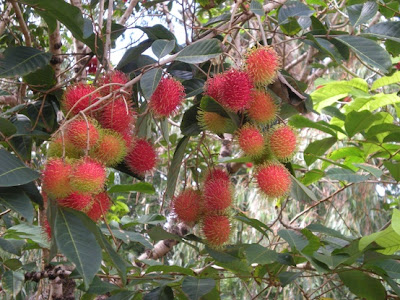The rambutan, like lychee, has a skin covered with thick red hair. The flesh is translucent and sweet, with a hard central core. The name of the plant is derived from the Malay word Rambut from the "hair" means and refers to the occupied fruit densely covered with bristles.
The rambutan is a fruit edible, very abundant in Southeast Asia, especially in Thailand. It is red in color (can also rarely present yellow or orange), with a hard shell coated with "thorns" tender, resembling small hedgehogs. Its interior is fleshy pulp with a translucent pink color, sweet and slightly acidic. Contains only one seed (seed), brownish, toxic, so it should never be consumed with their flesh.
Rambutan contains many nutrients such as glucose, minerals and vitamin C. The seeds of the plant, the fats and oils - mainly oleic acid and arachidic - include use in the production of edible oils and soaps. The roots, the bark and leaves of rambutan be varied as medicinal herb in Asian folk medicine used to find but also as dye use.
~~~
~~~
The rambutan is a fruit edible, very abundant in Southeast Asia, especially in Thailand. It is red in color (can also rarely present yellow or orange), with a hard shell coated with "thorns" tender, resembling small hedgehogs. Its interior is fleshy pulp with a translucent pink color, sweet and slightly acidic. Contains only one seed (seed), brownish, toxic, so it should never be consumed with their flesh.
Rambutan contains many nutrients such as glucose, minerals and vitamin C. The seeds of the plant, the fats and oils - mainly oleic acid and arachidic - include use in the production of edible oils and soaps. The roots, the bark and leaves of rambutan be varied as medicinal herb in Asian folk medicine used to find but also as dye use.
~~~
~~~



No comments:
Post a Comment